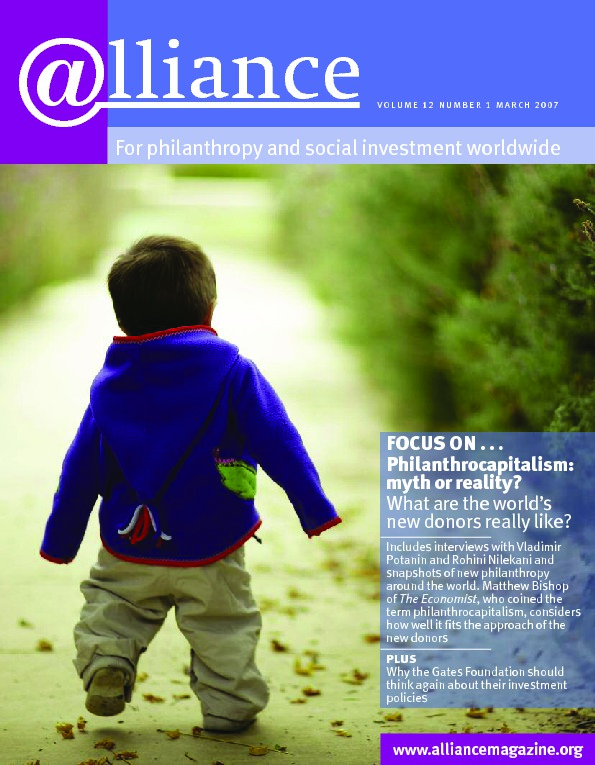The Philanthropy Workshop (TPW) is an international donor education and networking programme in which we work with donors from all over the world – inheritors, entrepreneurs, inheritors-turned-entrepreneurs and the family members of all of these.
In addition to giving us the opportunity to work with donors of great vision and commitment, this has enabled us to learn first hand who the so-called new philanthropists are. And here’s what we’ve learned in a nutshell: they’re not one thing, they’re many. New philanthropists are embracing a multitude of different approaches.
Now entering its 12th year, TPW is an intensive, three-week programme (spread over the course of the year) which aims to give new philanthropists the knowledge, skills and networks they need to be strategic in their giving. Incubated at The Rockefeller Foundation, it is now headquartered in London at the Institute for Philanthropy.
For us, strategic philanthropy is the investment of private capital to solve significant social problems. It is different from charitable or responsive approaches in that it seeks to solve social problems at their root and achieve greater impact by building on comparative advantage, identifying key leverage points, and funding in the gaps. We believe that high net worth individuals have a special opportunity here: they can take on the big, unpopular issues, they can invest significant sums systemically over time, and they can bring to the solution of problems their wisdom, experience and contacts as well as their financial capital.
Our experience has taught us much about the new face of philanthropy, the drivers behind what is often – and justifiably – called the second golden age of philanthropy. Perhaps most importantly, we have come to know that there is no single definition of what the new philanthropists are. We have worked with more than 120 donors in TPW and they are wonderfully diverse in their approach to giving.
Much is made in press coverage of the new philanthropy of the central belief in metrics. Our curriculum certainly emphasizes metrics, benchmarking and building a learning culture on one’s board – private philanthropic capital is too scarce to squander on ideas that have already proved futile. Likewise, we encourage our donors to share publicly what they have learned in their grantmaking not only in our network but more broadly, and to help spur the transfer of innovation across borders.
But our donors in general balance the need to know what works against the opportunity costs of knowing. They honour the work and wisdom of local communities and, while always concerned that investees are accountable for where and how effectively funds are spent, they often err on the side of trust rather than vigilance.
Another aspect of new philanthropy – that donors bring managerial expertise as well as financial capital – also resonates for large numbers in our network. As such, they are part of a growing number of new philanthropists who call themselves venture philanthropists – indeed, several have been leaders in that field.
But others have concerns about imposing their views, recognizing the power imbalance between donor and grantee and the undue influence donors can have on grantees as a result. They are concerned about the long-term sustainability of solutions if the capacity to create those solutions is not built into the organization. Once again, a diversity of donors with a diversity of approaches. No generalizing possible here.
The question of power imbalance also produces a frustration among many of the donors because it makes it difficult to have an honest dialogue with grantees. They want to move beyond what American participants refer to as ‘the dog and pony show’ into a real exchange about needs and solutions. While we emphasize in our curriculum that the onus for promoting such a dialogue rests largely with the donor (the disproportionate power holder), achieving it is a very complicated business.
In general, our donors care a lot about leadership, but not just any leadership – indigenous leadership. They want to be confident that solutions are home-grown and that leaders are from the community and representative of its aspirations. But where there is no opportunity to get to know the leadership directly, they are also generally comfortable to work with trusted intermediaries. The key is trust and mutual respect – respect between donor and grantee, respect between NGO and community.
Salvatore LaSpada is Chief Executive, Institute for Philanthropy. Email sl@instituteforphilanthropy.org.uk






Comments (0)